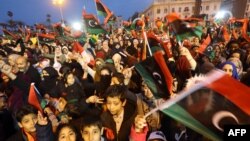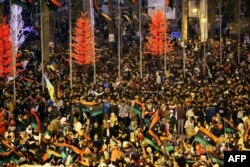February marks the seventh anniversary of the Libyan revolution, but many Libyans believe there is not much to celebrate as they are still waiting for the birth of a democratic state.
Since the fall of long-time leader Moammar Gadhafi in 2011, Libya has been torn apart by a power struggle waged by armed groups and competing governments.
The lack of security and basic services has become part of daily life for Libyans. The oil industry, the main source of revenue, still has not returned to its pre-revolution earnings.
Internal, external factors
"Internally, Libyans still are suffering from the legacy of lack of institutions and the ability to formulate a political consensus that allows them to negotiate power through a constitution and build a state," said Esam Omeish, executive director of the Libyan-American Public Affairs Council.
"They are still suffering from the overflow of weapons and the presence of militias that, unfortunately, prevent the ability to focus on political solutions rather than military ones."
Omeish says regional intervention is the major destabilizing factor. He said Egypt, the United Arab Emirates and other states derailed the recovery in Libya by backing General Khalifa Haftar, the commander of the so-called Libyan National Army. Their backing, Omeish said, encouraged Haftar to resort to force instead of joining United Nations efforts to reach a political solution. Haftar has the backing of a rival government based in eastern Libya.
Haftar opposes the national accord government in Tripoli, which was created by a U.N.-sponsored political agreement in 2015.
Nayira Abada, a Libyan activist, thinks Libyans are moving toward a political consensus that could pave the way for a democratic state.
"Looking to 2017 and 2018, we kind of understand and have more solid ground to reach a political agreement and we understood in general that we are reaching one goal, which is peace and security for Libya and the future generation," Abada said.
U.N. mediation
For three years, the U.N. and several Arab countries have tried to persuade the rival Libyan governments to comply with the 2015 deal.
Abada said that to save the negotiating process, the new U.N. special representative for Libya, Ghassan Salame, introduced a three-stage plan: amend the disputed political agreement of 2015, reconstruct the U.N.-backed government in Tripoli, and draft a constitution ahead of legislative and presidential elections later this year.
Aly Abu Zaakouk, a former minister of foreign affairs in the government of national salvation, argues that the most critical element needed is security.
"Without security you cannot have elections, you cannot have civil society, so if those international actors can play a good role, then the elections can be doable and a hope for Libya can be achieved," Zaakouk said.
But Abada thinks the new U.N. envoy could succeed.
"I think everyone is excited about Ghassan Salame. He has done, so far, a good job by meeting and speaking to everyone from different parties and cities. In addition, he understood what the Libyans need and explained what they need to do in 2018. And we are seeing Salame speaking to key influencers to ensure that the elections run smoothly," Abada said.
International community
But even if Salame gets a deal, Omeish says Libya will need help from the international community, including the United States.
"We have to use the will and the strength of the international players to force the spoilers, who are refusing to be part of the national accord path, in order to participate," Omeish said. "And we also need some international influence to be able to minimize meddling of the regional powers that has enabled some of the spoilers to continue on their path of imposing a military dictatorship despite the refusal of people to accept it."
Omeish notes, however, that while Libyans are disappointed that the revolution did not immediately lead to a democratic transition, there was a massive turnout to mark the seventh anniversary. And demonstrators were making clear they see no future for dictatorship in Libya.

